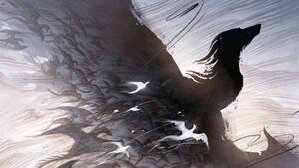It makes sense to approach Ted Chiang’s short stories, at least initially, as dramatized thought experiments. The author himself embraces the label philosophical science fiction and observes, “When philosophers propose thought experiments as a way of analyzing certain questions, their thought experiments often sound a lot like science fiction.” (The characters on The Good Place would probably agree.) But brilliant philosophy—and Chiang is brilliant—doesn’t itself account for how deeply felt and skillfully told his stories are. Just the opposite: it’s that attention to character and story that pushes the philosophy deeper than the abstract questions would usually go.
Ted Chiang. Photo credit: Arturo Villarubia (2011)
Like Stories of Your Life and Others, Chiang’s second collection Exhalation includes story notes in the back, in which he explains how “Omphalos,” for example, started as the question, “What would the world have to look like for it to confirm young-Earth creationism?” Tree rings in fossils could only go so far back before they’d just stop; the mummies of primordial humans would lack navels. Chiang chases his premise into linguistics, anthropology, geology, special relativity; there’s a palpable glee you feel as he follows a character pressing on all the seams of her world. Or take the title story, which is as perfect a Ted Chiang story as you can get; it’s so beautifully, dreamily strange I feel like a jerk trying to summarize it, but here goes: an anatomist from a race of robots takes apart his own brain and discovers within it a profound truth about the nature and limits of his universe.
It’s remarkable how good these thought experiments are as stories: they’re plotty and richly imagined, with enjoyable characters in high-stakes conflicts. The first story, “The Merchant and the Alchemist’s Gate,” is a time-travel adventure in medieval Baghdad, told like a nested story out of One Thousand and One Nights; and it’s pure pleasure to read, melding causal paradoxes with Islamic parable. (Who knew they’d resonate so well together!) In “The Lifecycle of Software Objects” and “Dacey’s Patent Automatic Nanny,” Chiang explores different emotional relationships we develop with machines—virtual A.I. pets in the former, mechanized nannies in the latter. It’s a theme I love, that a lot of people write about, and I happen to agree with Chiang’s outlook that these relationships will neither be exact replicas of human bonds or be totally dissimilar, either. Interacting with machines has a fundamental ghostliness to it, and while those interactions will evolve and refine, that uncanny valley in socialization will persist. But I don’t think Chiang’s point would carry quite so effectively if it weren’t made through watching his characters work out their machine relationships in real time. Following the virtual pet owners of “Lifecycle,” you feel, on a visceral level, that uncanniness alongside the affection, wonder, and stress of a young parent.
In this sense, Chiang’s stories are like a computational counterpart to philosophy. Mathematics has only recently accepted proofs of theorems based not on top-down, deductive logic, but on the empirical evidence of a computer running exhaustive simulations across all possible cases. Chiang’s stories are like this kind of simulation: he sets down his explorer character in a refitted world and probes its nature, not just through the discovery of facts, but in his characters’ lived experiences of the emotional and ethical challenges that world presents. To switch metaphors, plot becomes a kind of crucible, heating Chiang’s characters to a temperature that reveals the extreme limits of experience and understanding.
For each universe in Chiang’s collection involves a emotionally fraught limit: in “The Alchemist’s Gate” it’s the fixed nature of past and future; in “Omphalos,” it’s the universe with a hard stop to history (and only 5,872 stars!). For the parrots who live in the jungles near the radio telescope at Arecibo, in “The Great Silence,” that boundary is their own extinction, as well as the possible inevitability of extinction implied by the Fermi Paradox. In fact, when you look back at Chiang’s body of work, his characters are often running up against an unsettling finitude, whether it’s the literal roof of the world (“Tower of Babylon”), the exhaustion of human spermatozoa in five more generations (“Seventy-Two Letters”), or an exception to the consistency of arithmetic (“Division by Zero,” all collected in Stories of Your Life). There’s an existential, even a mystical thrill in Chiang’s characters pushing, pushing, and actually butting up against a discontinuity—a sign of some phenomenon or will beyond the characters that interrupts and delineates their existence. While I don’t think Chiang’s arguing for any religious thesis, it’s probably no accident his stories keep returning as well to the implications of God and a Creator.
Exhalation is a thrilling expansion of Chiang’s collected work, and whatever the limits of that may be, I hope they’re well and truly far off.












In this final novel of The Daevabad Trilogy, Ali, Nahri, and Dara are morally challenged beyond endurance by the rise of death magic in their beloved kingdom. How they respond changes everything.